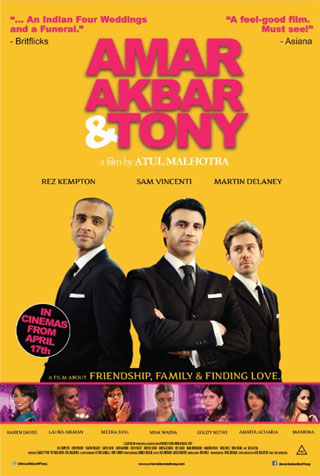 Director Atul Malhotra’s romantic comedy drama Amar Akbar and Tony set in present day multicultural London is getting ready to hit the big screen on Friday April 17th.
Director Atul Malhotra’s romantic comedy drama Amar Akbar and Tony set in present day multicultural London is getting ready to hit the big screen on Friday April 17th.
Written by Malhotra, AAT tells the tale of a a Sikh, a Muslim and an Irish Catholic who take stock of their lives in the coming-of-age story.
The film explores the predicaments that face its lead trio – Amar (Rez Kempton), whose promising career gets derailed by a turn of events, Tony (Martin Delaney), whose obsession with winning over the Asian woman of his dreams finds him pursuing the wrong woman, while Akbar (Sam Vincenti), an ambitious charmer, tries to manage business, love and friendship with the gift of the gab.
A British Independent film, Amar Akbar & Tony‘s cast offers a mix of some of the coolest talent in the UK including Karen David, Laura Aikman, Nina Wadia, Goldy Notay, Ace Bhatti, Mark Moraghan, Tanveer Ghani, Amrita Acharia, Dev Sagoo, Manrina Rhode Rekhi, Shide Boss and Meera Syal. Adding to the feel and the flavor, the original soundtrack and score for the film is composed by Rishi Rich.
In a wonderful and fascinating interview, Atul Malhotra gives an inside look into the making of the film, from how the classic Amar Akbar and Anthony inspired him, to praise for the cast, to the challenges, plus what he is most proud of and so much more!
What inspired you to make this movie?
Many things really. Firstly, I was struggling to see films that actually reflected people that I actually knew. Whenever I would see Asian people on screen, I didn’t believe the way they spoke. I didn’t believe the storylines. It just all kind of felt very unfamiliar to me. So, I wanted to do something where I could have the chance to really play around with that and reflect characters as I know them. But I also wanted to try doing something in terms of if a British Independent film and Bollywood film had a bastard child, this probably would be it. I guess that is kind of what this is. It is trying to merge those two very different filmmaking styles to see if we can come up with something new.
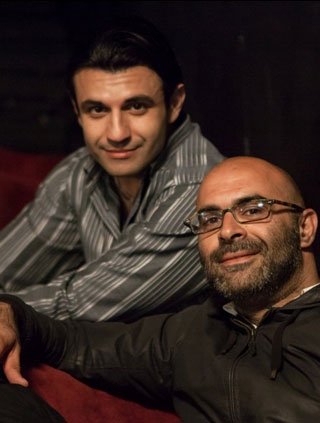 How much was the classic film Amar Akbar and Anthony an influence?
How much was the classic film Amar Akbar and Anthony an influence?
It is more of a spiritual influence. One of the things I was very keen to do with this film is reflect a positive side of London, as I know it. What I see of London is people of different cultures hanging around together and actually getting along. I wanted to reflect that. The spiritual connection with the Hindi film Amar Akbar and Anthony is the fact that in the film, you have these three brothers that get separated at birth, which is a common story plot in those days. One gets brought up in a Hindu household, another gets brought up in a Muslim household, and one gets brought up in a Christian household. They all lead their separate lives but their paths cross. They become friends, only to discover that they are actually brothers later on. I kind of like that, the fact that these guys are from different households. That is the one thing that connected me to Amar, Akbar and Tony…you have these three guys who have grown up in the same neighborhood. And they are kind of like brothers, but they are brought up in these different households. I guess at some point, I joined the dots with Amar Akbar and Anthony and it made me laugh. I thought ‘oh that would be interesting’, and I kind of developed that.
Also that stylistically and thematically, it touched on the fact that the film is a marriage between Independent cinema and Hindi cinema so that title sat correctly for me in that regard.
Tell us about developing the story of the film.
On the simplest level, when I set out to do the first or even the second draft, my starting point was what was life for me and a couple of my closest friends. What were we like at the age of 23 and what did we end up being like at the age of 31. Using a nine or ten year span to work with was kind of my stepping stone. In the sense that it allowed the story arcs to fall into place, because not everything has been hunky-dory or been happy, but what you have is this spine of friendship, which even though you are going through somewhat challenging circumstances, when you are actually with your core group of friends, even those challenging circumstances can sometimes be funny. Maybe only with them though and maybe not to the rest of the world. These guys have grown up together so their humor is very, very ingrained within each of them. That was the kind of template I was playing around with. It is a story spanning a certain time frame and it is the journey of these three guys they have their aspirations that things will go a particular way – for some they do, for some they don’t. Yet their solidarity is what keeps them together.
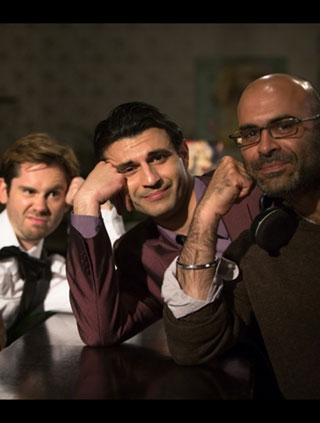 Let’s talk about the cast…
Let’s talk about the cast…
Rez Kempton, I think is one of the great actors of his generation. I would say that because I have known him for a very long time. We have made short films together. We made a short film together called If It Don’t Kill Ya awhile back and he was the lead in that. We had a really great relationship working together and we often have discussed the kind of films we want to do and how we want to try out different stuff. In AAT, Rez plays a character called Amar. For a part of the film he is a turban Sikh, and then for another part he loses his turban. One thing I realized is that I don’t think there is actually a Western film out there with a turban Sikh protagonist. You start stumbling on these things and you think why hasn’t this been done? Why isn’t this there? It is such a graceful look and I thought Rez carried that and that he could do that really, really well. He’s great!
Martin Delaney is funny! That man is funny! I remember when he walked into the room for the audition, he has the accent down pat, and he knows the lines immediately. I think the single most important thing is that when you hear these lines and you believe that character straight away then you just know. It is interesting when you hear other actors and you don’t believe them it is a really clear distinction as to who should be doing the part. It was him.
He was the Irish Catholic character in the midst of all these South Asians, was it different for him?
I think that is a really good question. Yeah, he was the minority on this film wasn’t he? Though within the cast and the crew, it is a pretty mixed bag of people. With the three guys, when they are together they really, really fell into character. The character of Tony is an honorary Indian and I think that Martin fell into that very, very well! I think he picked up a few Desi swear swords. He was a natural.
Sam Vincenti plays Akbar. Sam is slick. He is a mesmerizing guy on screen. The character of Akbar is a real charmer – he has the gift of the gab and a lot of patter. I read quite a few people for this part because this character has got a lot of lines and he has got to pull them off with that right kind of balance of being charming yet saying some very annoying lines. Sam does it and he does it really well. He’s great on screen.
You know, I looked at three different sets of three actors to see how they would work, and these guys just felt like they had known each other forever and they just felt like a really natural fit.
 Karen David is amazing. She is just such a talented lady, being able to sing, to do comedy, to do drama – her range is so impressive! In this she plays a character called Meera, who arrives from India. She does it beautifully. It is so nice to see her in the Indian outfits as well – she is such a stunning lady. She is just such a pleasure to work with. This role is something very different from what she has done before; I think her fans are in for a treat.
Karen David is amazing. She is just such a talented lady, being able to sing, to do comedy, to do drama – her range is so impressive! In this she plays a character called Meera, who arrives from India. She does it beautifully. It is so nice to see her in the Indian outfits as well – she is such a stunning lady. She is just such a pleasure to work with. This role is something very different from what she has done before; I think her fans are in for a treat.
Laura Aikman is a very established TV actress in the UK. She has great funny bones though she doesn’t play the out-and-out comedy role here. She is phenomenal. I was very fortunate to find Laura. Again, she was the first girl to read for that part. She walked in at 10 o’clock in the morning and the rest of the day was everyone trying to read for this character of Samantha. For some reason, someone comes in and just locks that part. It was very hard to shake her performance off.
Goldy Notay is another brilliant actor. She has been doing a lot of really interesting stuff. She plays a character called Sonia, who is kind of a Southhall slut for lack of a better expression. (Laughs) She plays it really well because she is such a good actress. She was a real treat. I think she pulls off the character really, really well.
This whole film is an ensemble piece, it is one of those ones where you need everyone to deliver their bit and they all did.
It seems when I watched the trailer and from talking with you and the cast, that you all really connected and worked to really make something special while creating this work.
Stacey, I think that is a really fair comment because it did feel like that. I think people really, really got behind the script, which was really lovely. The actors that came onto this film came on because they really wanted to make this film. It certainly wasn’t the money (laughs) because it is an independent film so we didn’t have the cash. It was just about trying to make something different. I think you could feel the pulse of that with everybody that was involved. We are all still friends and we all still really like each other. We had a really good time making the film and hopefully it shows on the screen as well.
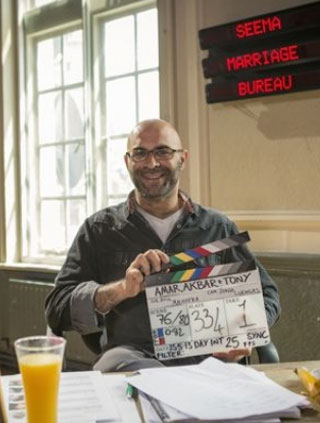 This is your first feature film. What was the most challenging thing about making the film?
This is your first feature film. What was the most challenging thing about making the film?
The most challenging thing was when you are doing an independent film, which isn’t financed, half your energies are going out there to try and raise money and also doing 5-6 different roles. For example, we didn’t even know the locations of where we were going to be filming, we would find them literally a day or two before you are shooting there. Those kinds of elements were really challenging during the shooting because we didn’t have enough money to shoot at certain locations. You would be haggling to the bitter end and then eventually you would have to do something else. Adapting to that kind of stuff was pretty challenging.
But with shooting in this way also there is a certain spontaneity within it. When I am talking about this now, there is part of me that believes in happy accidents. Yes, of course you would love to have X and Y and such and such thing happening. But actually by sometimes not having those things happening, things not going exactly as per plan, perhaps it creates a different energy and vibe and I think that is captured within the film.
Why do you think it was a challenge to get this film released?
First, it is a challenging arena for any independent film, not just exclusively ours. I think the second layer that we have attached to us is that we are automatically just being ghettoized as being an Asian film. I do not have problems with that, but I feel we are very much a London film, a multicultural film. But because there are predominately Asian people in the cast, we were slotted in. What you have with distributors is the first thing they do is look at comparative titles. They look at what the genre would do – so you would look at what would horror do, what would a romantic comedy do, etc. – that is what would happen with other films.
In this instance, our genre has become the color of the people in the film so it is British Asian, but that is not actually a genre in real terms. Your comparisons are being done with other British Asian films and what has happened, unfortunately, in the last 10 years certainly since Bend it Like Beckham and East is East, films with British Asian people in them haven’t exactly been box office gold. So they look at comparative title, it is British Asian and it is almost like they don’t bother what the storyline is or what the actual genre is, they just go British Asian. You are automatically being put into that little pocket and I think that is what makes it difficult.
Then you will go into a distributor and they will say what is this title Amar Akbar and Tony? I can’t even pronounce it and nobody will get it. You will say yeah, but there is probably about a billion people in the world who actually just get it straight away. That is a very hard thing to translate to distributors who are not aware of that arena.
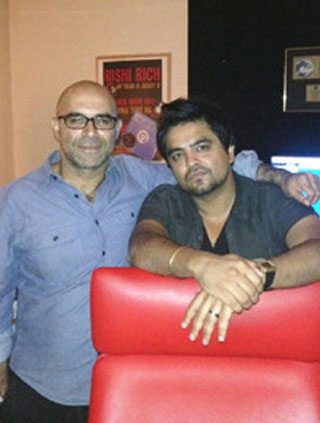 Let’s talk about the music by Rishi Rich.
Let’s talk about the music by Rishi Rich.
We have an amazing soundtrack. It is a really cool soundtrack. It is a mixture of Indian based music as well as pure English tracks. It is a really good range and it kind of reflects the film. Apart from the soundtrack itself, Rishi also did the score. When you see the film you will see that the music is another character. That is Rishi bringing life into it. He was the perfect marriage for this film because he is one of these guys, he is one of people that are portrayed in the film. Ironically, when he started with Juggi and Jay Sean they were Amar, Akbar and Tony in their own way. You have these three guys who grow up together and hang around and pursue stuff together so he got the spirit of it straight away.
What makes you the most proud about the film?
I am the most proud about the performances in the film. I just feel so lucky that these actors came on board and took it on. I believe every single one of them in the film. Sometimes you get in the edit room and you are like…but I did not feel that with any of these guys. I just loved and laughed and enjoyed each of their performances. I am really proud about that because I feel I succeeded there in terms of trying to reflect people that I believe in on screen.
I am proud to have made the film, but most importantly I will be very proud to actually get this film to an audience and I hope they will actually enjoy it!
What is the underlying message of AAT?
I think there is probably a live-and-let-live aspect to this film. It is not so much a didactic kind of message thing, it is more of a spiritual message in terms of hey, look these three guys can get along, we can get along. Just take a step back from some of this stuff and take a look at it from a slightly humorous perspective as opposed to an aggressive one – if you see what I mean. Let’s just step back and try to enjoy each other. I say this with in regard particularly to London, but I think it applies everywhere, that we are very, very fortunate to be able to live side-by-side and to get to grow up with people from all over the world in one place. That is an amazing thing. But it is only amazing if you can let yourself be a part of it rather than closing yourself off from that opportunity.
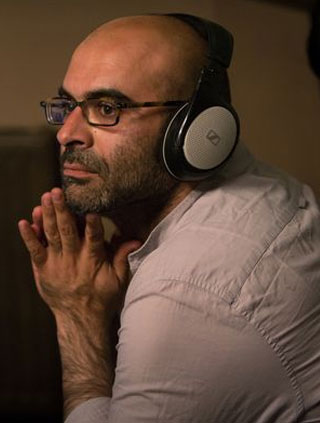 How do you think this film will change how people see Indian characters on screen? Because as you said, you want to show people you knew growing up and that in other films you don’t recognize anybody. How do you hope this film will change that?
How do you think this film will change how people see Indian characters on screen? Because as you said, you want to show people you knew growing up and that in other films you don’t recognize anybody. How do you hope this film will change that?
I don’t know if this film will change that per se, but I certainly think that we should be trying more stuff, different things. I think this is just me throwing my hat into the ring. Amar Akbar and Tony is part of a triptych of films I have about the British Asian experience. They are three very different stories that I have in mind and this is just the first of them. I think it is just about trying to shake up the characters and try different approaches and give the actors a chance to do something other than that same old accent that they keep having to do.
What do you think of Bollywood films today?
I think there are some amazing filmmakers coming out of India. They are really trying a lot of different storylines, a lot of different cinematic techniques. Guys like Vishal Bhardwaj, Anurag Kashyap, Vinod Chopra are making different films. There are some great films coming out. I have grown up on Hindi cinema and I am very fond of it. I still watch it regularly. It is one of the few remaining films that holds its own against Hollywood classic narrative. When you see a Hindi film you get comedy, you get drama, you get melodrama, you get action and it is all wrapped into one film. And I think it is interesting with Amar Akbar and Tony and I will go back to that bastard child analogy in that there are elements of going to an Indian film except treated in a British film kind of way.
What do you want to say to the audience about the film?
I want to say come and watch the film. It is a fun film. One of the things that would be a great satisfaction is when you see you generally have a belly laugh and enjoy the characters and enjoy the world.
I would like to thank Atul for the wonderful chat. It is always amazing when an interview turns into a real conversation and that happened about this film and I enjoyed every second of it!










